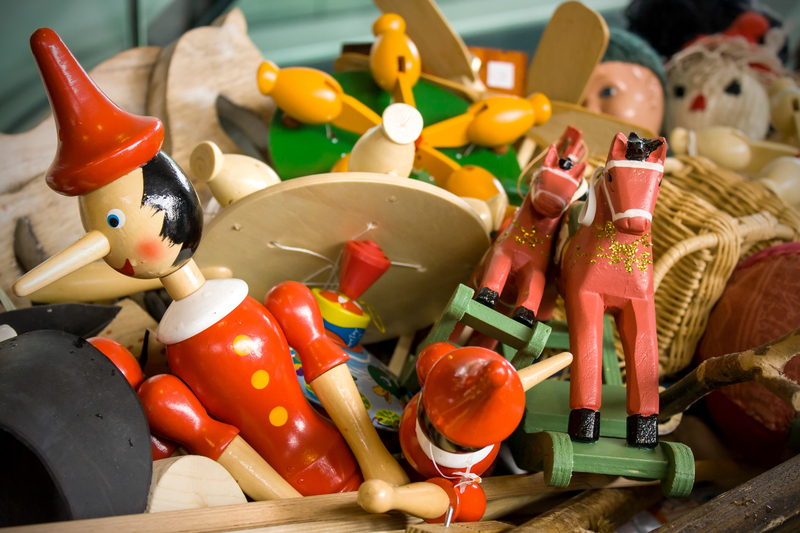Money-Saving Hacks for Bulky Item Waste Removal
Removing bulky items from your property can often be expensive, stressful, and time-consuming. Whether you are decluttering your home, moving, renovating, or simply upgrading furniture and appliances, you are likely to accumulate large waste that can't just be placed at the curb with the rest of your weekly garbage. To help you handle bulky waste removal more efficiently and save money in the process, we've put together a comprehensive guide packed with practical tips, resourceful strategies, and effective hacks.

Why Is Bulky Item Disposal Expensive?
Understanding the costs associated with bulky item waste disposal is key to finding the best ways to manage it. Standard waste collection services rarely accept items like old couches, refrigerators, mattresses, or construction debris. Specialized removal services have to contend with challenges such as:
- Limited landfill space and high disposal fees
- The need for special equipment and vehicles for transport
- Labor costs for heavy lifting and safe handling
- Compliance with local disposal regulations
- Distance to recycling or disposal facilities
But don't worry - there are numerous creative and cost-effective bulky item removal hacks that homeowners and renters can use. Let's explore the top ways to cut costs and reduce hassle during your next big cleanout.
Top Money-Saving Hacks for Bulky Item Waste Removal
1. Utilize Free Municipal Pickup Services
Many cities and towns offer free bulky waste collection services once or twice a year. Check your local public works department website or call to find out:
- What items are accepted (furniture, appliances, electronics, etc.)
- How to schedule a pick-up
- Pickup calendar and scheduling details
- Preparation instructions (e.g., refrigerants removed from fridges, or items bundled for ease of lifting)
Tip: Mark the dates on your calendar and organize your bulky waste accordingly to take advantage of these free or low-cost services as often as possible.
2. Donate Unwanted Items to Charities
One person's trash is another's treasure! Many charitable organizations and non-profit groups accept gently used furniture, appliances, and more. Donating bulky items saves money on disposal fees and helps those in need.
- Charities like Habitat for Humanity ReStores, Salvation Army, Goodwill, and local shelters often offer free pick-up services.
- Ensure items are clean and in usable condition.
- Obtain a receipt for charitable donation tax credits (where eligible).
Bonus: Donating helps the environment by expanding the life of usable items and diverting waste from crowded landfills!
3. Sell Bulky Items Online
If you have items that still function or have value, consider listing them on online marketplaces. This can offset your removal expenses--or even earn you extra cash!
- Popular platforms include Facebook Marketplace, Craigslist, Letgo, OfferUp, and eBay (for certain items).
- Be honest in your descriptions, include measurements, and upload clear photos.
- Price items to sell fast, or offer them for free (buyer pick-up only).
Pro Tip: Offer discounts for buyers who remove items themselves. This saves you the heavy lifting and possible transportation fees.
4. Repurpose or Upcycle Bulky Waste
Before you pay to haul away big items, get creative! Upcycling is both eco-friendly and budget-friendly:
- Transform wooden furniture into garden planters, benches, or storage solutions.
- Old mattresses can be disassembled -- springs and foam are repurposed for crafts and projects.
- Use large appliance shells for garage storage or backyard play areas (with safety modifications).
Not only does this approach avoid removal costs, but it also adds unique character to your home!
5. Organize a Neighborhood Cleanout Event
Strength in numbers! If several households need bulky waste removal within a similar timeframe, coordinate a neighborhood junk removal day:
- Share the cost of a dumpster or professional removal service.
- Negotiate group discounts with junk removal businesses.
- Encourage swaps--your neighbor's trash may be your treasure!
Many waste collection companies will offer significant bulk discounts for group bookings.
6. Check Your Appliance Retailer's Take-Back Policy
If you're replacing an appliance, ask retailers about their haul-away programs. Most large stores (such as Home Depot, Lowe's, Best Buy) offer to remove your old item for free or a small fee when you purchase a new one.
- Schedule delivery and removal at the same time to save effort and money.
- Ask if they recycle the appliances, ensuring eco-friendly disposal.
7. Take Items Directly to Recycling Centers or Landfills
Cut out the middleman and haul items directly to your local "transfer station," recycling center, or landfill. This is generally far cheaper than hiring a junk removal company.
- Call ahead for guidelines--some centers may provide free drop-off for residents on certain days.
- Check disposal fees and accepted materials lists.
- Separate metal, electronics, and recyclables for lower fees or free recycling.
Important: Always secure your load when transporting bulky items yourself for both safety and legality.
8. Rent a Dumpster (or Share With Neighbors)
For larger home renovations or major cleanouts, dumpster rental can be surprisingly cost-effective, especially if you share with others.
- Choose the smallest dumpster size you need to reduce costs.
- Shop around - rates can vary widely between companies.
- Ask about restricted items and overage fees before booking.
Neighborhood shares can dramatically reduce the cost-per-household for a dumpster rental.
9. Sell Scrap Metal and Recyclables
Many bulky items like appliances, bed frames, and exercise equipment contain valuable metals and recyclable materials. Local scrap yards often pay by weight for ferrous and non-ferrous metals.
- Remove all non-metal parts (plastic, wood, foam) for higher returns.
- Check current metal prices and policies before hauling in a load.
This hack not only saves on disposal costs--it can put cash back in your pocket!
10. Use Local "Freecycle" Groups
Many cities have active Freecycle communities, where residents give away items for free to anyone able to pick up and haul them away.
- Find your local Freecycle group at Freecycle.org or check Facebook "Buy Nothing" groups.
- List items with clear pickup instructions.
This is a win-win solution for bulky waste removal and community sharing!
Essential Tips for Reducing Bulky Waste Removal Costs
- Plan Ahead: Don't wait until the last minute. Give yourself time to explore free removal options and maximize value from donations or sales.
- Consolidate Loads: Gather multiple items for removal at once to save on transportation fees and landfill trips.
- Disassemble Large Items: Break down furniture and items into smaller pieces to fit in standard vehicles or garbage bins.
- Compare Multiple Services: Always get quotes from several bulky item waste removal companies and ask about price-match guarantees.
- Stay Informed About Local Regulations: Avoid fines by following city-specific rules for disposing of electronics, appliances, and hazardous waste.
What Items Are Considered Bulky Waste?
- Sofas, couches, and armchairs
- Mattresses and box springs
- Tables, desks, dressers, and cabinets
- Large appliances (fridges, stoves, washing machines)
- Carpet rolls and rugs
- Bathroom fixtures (toilets, tubs)
- Lawnmowers, exercise equipment, grills
- Old televisions and electronics
- Construction debris (wood, drywall, etc.)--check if allowed in your area
Always check with your local waste authority for a full list of accepted bulky items.
Eco-Friendly Bulky Waste Removal Alternatives
Disposing of large waste responsibly is important for the planet. Here are the best green solutions:
- Recycle wherever possible: Many transfer stations take electronics, appliances, tires, and metals for proper recycling.
- Support businesses specializing in sustainable disposal: Some junk removal companies prioritize recycling and donation over landfill dumping.
- Community "reuse days": Swap gently used items at local events to keep bulky goods in service longer.
- Avoid dumping or illegal disposal: Fines for improper bulky waste dumping are steep and environmentally damaging.

Frequently Asked Questions About Bulky Waste Removal
How can I remove bulky items for free?
Utilize municipal collection days, local charities, online marketplaces giving items away, and Freecycle groups to avoid disposal costs entirely.
Is hiring a junk removal company worth it?
Professional junk removal offers convenience and labor, but it's typically the most expensive option for bulky item removal. Use it as a last resort, compare quotes, and combine items with neighbors for lower group rates.
What does bulky item disposal cost?
Costs range widely, from free (self-removal or donation) up to several hundred dollars for professional pickup, depending on size, number of items, and your location. Check for hidden fees and minimum charges before booking any service.
Can I put bulky items on the curb with regular trash?
Rarely, unless your city specifically schedules a bulk trash day. Placing bulk waste outside of approved days could result in fines or refusal to pick up.
Are there environmental regulations I should be aware of?
Yes! Certain items (refrigerators, TVs, electronics, hazardous waste) require special disposal procedures. Never dump items illegally. Always follow local laws for responsible waste management.
Conclusion: Save Big on Bulky Waste Removal
Removing bulky waste doesn't have to break the bank. By planning ahead, using donation and resale channels, upcycling creatively, and taking advantage of city and community programs, you can significantly cut your bulky item removal expenses while supporting sustainability.
Take action today and turn your big waste problems into opportunities for saving money and helping your local environment. For even more localized advice, always consult your city's waste management resources. Happy decluttering!